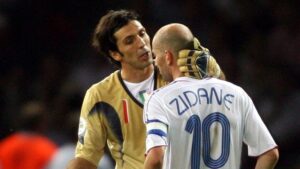Gianluigi Buffon, one of football’s most revered goalkeepers, recently offered candid insights into his illustrious career during a book presentation event in Turin.

The legendary Italy and Juventus star took questions from reporters, delving into pivotal moments, both triumphant and challenging, that shaped his remarkable journey on and off the pitch. His new book, which serves as the backdrop for these reflections, promises a deep dive into the philosophy behind his extraordinary career.
The Philosophy of Goalkeeping: A Metaphor for Life
Central to Buffon’s new literary work is the profound idea that goalkeeping itself serves as a powerful metaphor for life’s inevitable ups and downs. “The theme of the book is that goalkeeping is a metaphor for life,” Buffon explained. “You fall, get back up, fall, get back up. There are always going to be falls, but the important thing is finding the motivation to get back up again.”
This perspective highlights the mental resilience and unwavering determination required not just to excel in his demanding position but to navigate the broader challenges of existence. It paints a picture of a career defined by perseverance through setbacks, echoing the constant need for recovery and renewed effort that defines a goalkeeper’s role.
2006 World Cup Final: Buffon, Zidane, and the Pre-VAR Moment
Among the many highlights of his career, the 2006 FIFA World Cup victory with Italy stands as a crowning achievement, culminating in a dramatic penalty shootout triumph over France. However, that unforgettable night was tinged with a moment of controversy:
Zinedine Zidane’s infamous headbutt on Italy’s Marco Materazzi. In an era predating the widespread introduction of Video Assistant Referee (VAR) technology, Buffon found himself in a unique and crucial position.
“At that moment, I was the VAR,” Buffon chuckled, recalling the incident. He vividly recounted witnessing the shocking foul in real-time from his vantage point in goal. His immediate reaction was decisive: he swiftly rushed towards the area where the incident occurred to inform the referee, Horacio Elizondo, about what he had seen. Buffon’s prompt intervention, combined with the fourth official’s ability to review the incident on television monitors, ultimately led to Zidane’s red card.
“My reaction and my run towards the area where it happened made sure that the referees realised what had transpired,” Buffon asserted. “They will never admit it, of course, but they saw it back on the television monitors. I was the only one who saw everything that happened in real time.” This anecdote offers a fascinating glimpse into a pivotal moment in football history and Buffon’s unexpected, but critical, role in its resolution.
Behind the Scenes: A Coach’s Blame and a Player’s Laughter
Buffon’s reflections also touch upon the less glorious moments, including Italy’s disappointing early exit from the 2010 World Cup in South Africa. The tournament marked an ill-fated return to the coaching role for Marcello Lippi, who had guided them to World Cup glory four years prior. Buffon recalled the somber mood in the dressing room after their elimination. “I was injured, so I got back into the dressing room and saw everyone distraught, with their heads in their hands,” he recounted.
It was Lippi’s unexpected reaction that provided a moment of dark humor for Buffon. The coach, surprisingly calm yet detached, addressed his dejected squad with an astonishing admission of fault:
“‘Lads,’ he said, ‘It is not your fault, it is my fault that like an idiot I brought you here.'” Buffon, known for his lively personality, couldn’t help but react. “I will admit, I went and hid in the shower so I could laugh at that,” he confessed, offering a rare, human glimpse into the aftermath of a major sporting disappointment.
The Ebullient Goalkeeper: Personality and Presence
Throughout his extensive career, Gianluigi Buffon, affectionately known as ‘SuperGigi,’ was celebrated not just for his incredible saves but also for his vibrant and ebullient personality. Even from his debut as a teenager for Parma against formidable opponents like AC Milan, he displayed an innate confidence and a knack for engaging with the crowd.
“I was young, irreverent, very confident in myself, but also smart,” Buffon explained, reflecting on his early days. He understood the need to reassure his adult, champion teammates, and he did so by projecting his self-assurance rather than succumbing to his own nerves. This ability to influence the atmosphere, to “whip up the crowd” even from his solitary position in goal, became a hallmark of his play.
Goalkeeping: The “Superpower” of Instant Influence
Buffon eloquently described a unique “superpower” he discovered while stationed between the posts. This power stems from the goalkeeper’s singular perspective on the match, particularly during its most tense moments. “In those final minutes of matches, you get to feel the passion of the crowd and it draws you in too on the field,” he elaborated.
“You realise the moment of suspense, the cheer for a save, or the joy for a goal. The ability to change the mood of so many people in an instant is a superpower I discovered that I had.” This insight offers a profound understanding of the psychological impact a goalkeeper can have, transforming collective anxiety into elation with a single, perfectly executed save, truly embodying a moment of shared human emotion.
Buffon’s Legacy: Beyond the Pitch
Gianluigi Buffon’s career transcends mere statistics and trophies. His reflections from his new book offer valuable lessons not just about the game of football but about resilience, leadership, and the human spirit.
From his pivotal, unscripted role in a World Cup final to his candid insights into team dynamics and personal growth, Buffon continues to cement his legacy as one of football’s most compelling and thoughtful figures, long after hanging up his gloves. His unique perspective on the sport and life ensures his insights remain highly discoverable and relevant to fans and aspiring athletes alike.







